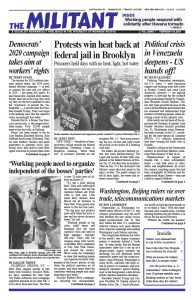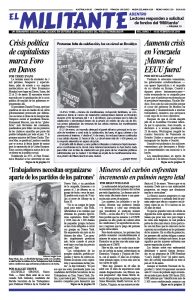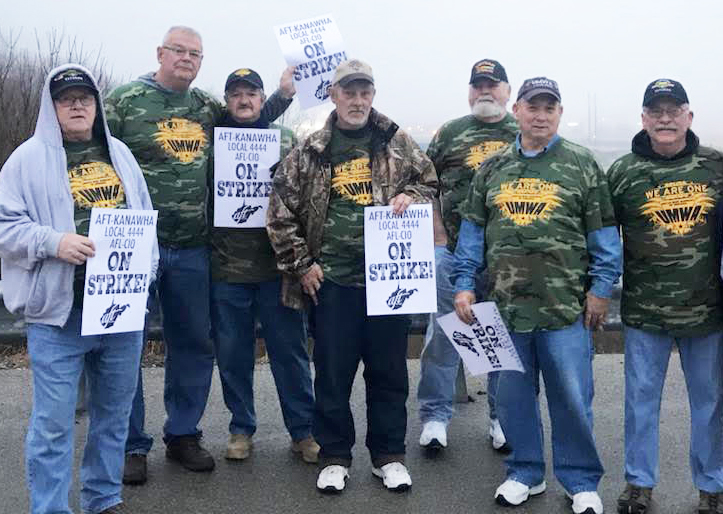The six-day strike in Los Angeles by more than 30,000 teachers deserves further assessment. This is in the interest of all those in the working class who participated in the walkout, and all those across the country interested in how we can fight effectively.
The Feb. 4 Militant says, “Los Angeles Teachers Won with Broad Strike Support.” A more accurate headline would have been “Los Angeles Teachers Make Modest Gains with Broad Support.”
There was broad support for the strike, but it wasn’t mobilized to win what the teachers deserved.
I walked the picket line on several occasions at Dorsey High School, near where I live. The spirit was high and often you heard honking from passing motorists. I rode the train with teachers to City Hall to march to the Board of Education on the Monday the strike began.
Thirty of my co-workers at Walmart signed a card expressing solidarity with teachers who were standing up. Every worker I asked signed the card. This was a reflection of working people’s desire to see successful fights conducted against the anti-working-class offensive of the bosses, the local state and federal governments.
California is a so-called blue state, with the Democratic Party firmly in command in the governor’s mansion, the state legislature, and in City Hall in L.A., San Francisco and many other cities. This political establishment presides over the deepening carnage millions of workers and farmers here face.
The cutbacks in school funding go hand in hand with the rulers’ cutbacks in funding for health care and other social necessities for working people, and the bosses’ attacks on wages, speedup on the job, and the gutting of safety protection.
Teachers in Los Angeles, like all teachers and public employees, confront the capitalist rulers only indirectly. The teachers’ employer, the Los Angeles Unified School District, isn’t run by capitalists, but government bodies that represent the class interests of the bosses.
Teachers don’t have the power to shut down production and cripple their bosses. The capitalist rulers don’t put much value on “education.”
Learning under capitalism
This was taken up in a campaign statement urging support for the teachers strike I released that was printed in the Militant. It pointed to Are They Rich Because They Are Smart? Class, Privilege, and Learning Under Capitalism, by SWP National Secretary Jack Barnes. “In the US today, under capitalism, the only future we can count on is one in which education will worsen — in which education will fuel rather than retard social differentiation. There will only be ‘education’ to squelch curiosity and creativity among the vast majority of youth, and to encourage escapism,” Barnes says.
“It is not true that the capitalist class needs for workers to be educated; it’s a lie. They need for us to be obedient, not to be educated,” says Barnes. “Above all, they need for us to lose any desire over time to broaden our scope and become citizens of the world.”
Teachers’ union officials and many teachers tend to argue their profession is somehow special. Education is crucial under capitalism to move up, they say. But this isn’t true, at least not for all but a tiny handful.
Teachers are workers, who deserve higher pay and more human working conditions. We should mobilize and fight to win that.
But the fight for learning is a different story. That’s a broader class and social battle that can only be won by a fundamental change in society that puts human beings and their needs before private profit.
The living example of the Cuban Revolution shows what is possible. Workers and farmers, with class values and priorities opposite to those taught by the dog-eat-dog capitalist system, took political power in 1959 and began using it to mobilize the toiling majority to meet their needs. In 1961 their revolutionary government organized some 100,000 young volunteers in literacy brigades to wipe out widespread illiteracy in a single year. This opened the door to widen access to culture and political life for working people, a step that was crucial for strengthening the revolution.
“To be meaningful, education has to create the possibilities for society as a whole to advance, instead of reinforcing the exploitation of the majority by a few,” Barnes writes. “Until then, the only ‘liberal education’ available to any fighter who wants one is political education within the workers movement.”
Independent, working-class road
The other problem the teachers faced was their union officials’ strategy of reliance on Democratic Party officials. And it’s deadly. For public workers in particular, it means orienting toward those who are your bosses, the ones responsible to the capitalist rulers to keep you in check. They’ve been presiding over cutbacks in education.
The only road for school workers is to turn to the unions, to all those who face the attacks of the bosses today. We have a common interest in fighting to defend and advance the wages and working conditions of all working people.
This was the power shown in the example of last spring’s teachers strike in West Virginia. In the book In Defense of the US Working Class, SWP leader Mary-Alice Waters calls that strike “one of the most significant strikes in a quarter century” that “exploded onto the national scene. Some thirty-five thousand teachers, janitors, bus drivers, cafeteria workers, and other public school employees walked off the job together, defying past court rulings denying public employees the right to strike.”
“With support from their pupils, families, unions and churches — and a living memory of the many bitter strikes fought by miners — they organized emergency food services for students and strikers. Daytime activities for the children were put in place. In the best tradition of trade unionism — and a precursor of the fighting labor movement that will again be built — the strike took on elements of a genuine social movement, battling for the needs of the entire working class and its allies.”
Unlike that strike, the L.A. teachers strike didn’t strengthen their ability to fight against future attacks. The union leadership led by Alex Caputo-Pearl put winning a settlement for the strike in the hands of L.A.’s Democratic Mayor Eric Garcetti, and other top California Democrats.
That’s why what teachers “won” was more limited than it should have been.
Dennis Richter is the Socialist Workers Party candidate for City Council in Los Angeles District 12.


